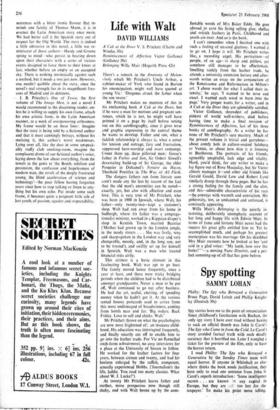Life with Walt
DAVID WILLIAMS
A Cab at the Door V. S. Pritchett (Chatto and Wind us 30s) Reminiscences of Affection Victor Gollancz (Gollancz 30s) Belonging Willa Muir (Hogarth Press 42s) There's a remark in the Anatomy of Melan- choly which Mr Pritchett's Uncle Arthur, a
cabinet-maker of York who found in Burton his emancipation, might well have quoted at young Vic: `Diogenes struck the father when the son swore.'
Mr Pritchett makes no mention of this in his enchanting book A Cab at the Door, but
if he were a man for mottoes and pregnant sen- tences, which he is not, he might well have printed it on a _page by itself before setting out on this autobiography, since it gives terse and graphic expression to the central theme he wants to develop. Father and son, what a ticklish relationship it always is, what a cover for tension and outrage, fury and frustration, suppressed hero-worship and overt contempt.
Count them up, these pilloried men : Gosse's
father in Father and Son, Sir Osbert Sitwell's devastating build-up of Sir George, the elder Pasquier in Duhamel's Notaire du Havre, Theobald Pontifex in The Way of All Flesh. The dangers fathers run from literate sons aren't made any the less by reason of the fact that the old man's enormities can be noted—
exactly, yes, but also with affection and even love. This is very true of Mr Pritchett, who was born in 1900 in Ipswich, where Walt, his father—only twenty-two—kept a stationer's shop. Walt had run away from his home in
Sedbergh, where his father was a congrega-
tionalist minister, worked in a Kippsian draper's shop in Kentish Town, married Beatrice ('Mother had grown up in the London jungle,
in the needy streets . . . She was lively, sexy and sharp-spoken in the London way and very
changeable, moody, and, in the long run, not to be trusted'), and swiftly set up for himself in Ipswich. Walt was a man who treated financial risks airily.
This airiness is a basic element in this fascinating book. Walt was apt to go bust The family moved house frequently, once a year at least, and there were tricky bridging periods when the children had to be distributed amongst grandparents. Never a man to be put off, Walt continued to go out after business. He had the art, useful, exciting, of spending money when he hadn't got it. At the various rented houses postcards uGed to arrive from this most undismayed of breadwinners, codling from hotels near and far. Sig orders. Back Friday. Love to self and chicks. Walt.'
Mr Pritchett throve on what the psychologists are now most frightened of: an insecure child-
hood. His education was interrupted frequently, and finally smartly cut off to enable him to go into the leather trade. For Vic no flannelled sixt,h-form schwiirmerei, no cosy interviews for a place at the University of Sussex to follow. He worked for the leather factors for four years, between sixteen and twenty, and had his horizon enlarged by the raffish, competent, sexually experienced Hobbs. ('Journalism's the life, laddie. You read too many classics. What about W. J. Locke?')
At twenty Mr Pritchett leaves father and mother, more prosperous now though still shaky, and with Walt borne up by the com- fortable words of Mrs Baker Eddy. He goes abroad,)o earn his living selling glue, shellac and ostrich feathers in Paris. Childhood and youth are over. And so is the book.
I can't remember when I finished one with such a feeling of unsated gluttony. I wanted it to go on. I hope it will. Mr Pritchett writes like, a recording angel. His portraiture—of people, of an age—is sharp and pitiless, yet somehow still manages to be affectionate. Smelling rankly from the leather trade, he attends a university extension lecture and.after- wards writes an essay on the conjunction of the Renaissance and Reformation in Milton's art. 'I chose words for what I called their in- tensity,' he says. wanted to be terse and exact. I wanted each word to burn into the page.' Very proper wants, for a writer, and in A Cab at the Door they are splendidly satisfied.
Victor Gollancz, shrewdest of publishers, pinkest of world well-wishers, died before having time to make a final revision . of 'leminiscences of Affection, last of his three books of autobiography. As a writer he has none of Mr Pritchett's sure mastery. Much of the present volume is trivial and garrulous— about comfy hols in culture-soaked Salzburg or Venice, or about how nice it is listening to Beethoven. The portraits of his friends, agreeably unspiteful, lack edge and vitality. Hard, you'd think, for any writer to make a lay figure out of Rose Macaulay, but Sir Victor almost manages it—and other old friends like Gerald Gould, David Low and Robert Lynd similarly droop through these pages. But he has a strong feeling for the family and the clan, and this—admirable characteristic of his race —be conveys with warmth and conviction. His generosity, too, so undaunted and unforced, is constantly appearing.
Willa Muir's Belonging is the quietly in- teresting, deliberately unemphatic account of her long and happy life with Edwin-Muir. In terms of fame and fortune Muir never had the success his great gifts entitled him to. Yet he accomplished much, and perhaps his greatest masterpiece was his marriage. On his deathbed Mrs Muir recounts how he looked at her 'and said in a glad voice: "My lamb, how nice thu looks!" '—a moving Nunc Dimitti.s, and a per- feet summing-up of all that has gone before.


































 Previous page
Previous page